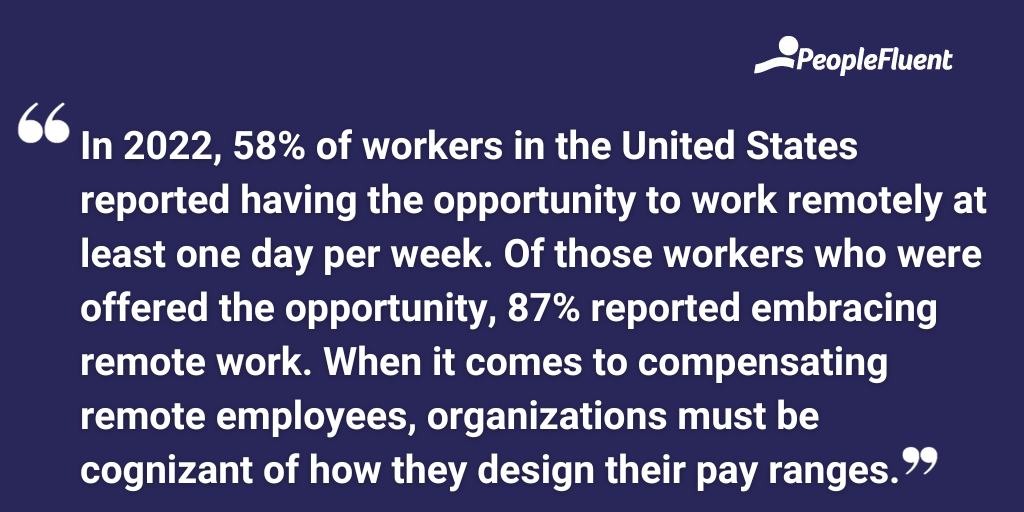Published: Dec 5, 2023Time to read: 5mins Category: Compensation
How to Gain a Competitive Edge With Compensation Technology
Organizations leveraging technology like compensation planning software have an inherent advantage over their competitors relying on manual processes. In this blog post, learn how taking advantage of technology can help your organization get ahead and prepare for the future.
Regardless of your industry, manual spreadsheets are no longer an effective way for enterprise companies to manage compensation strategies. Embracing technology like compensation management software gives organizations a leg up on competitors by freeing up time and resources for HR departments. With less time to spend on award cycle calculations, HR leaders can put their energy into implementing strategies that will improve your business outcomes.
Compensation software comes with an abundance of features that organizational leaders can use to make data-informed and future-forward decisions. Below, we’ll discuss how using software also makes it easier for leaders in different departments to collaborate in ways that will benefit your organization.

READ MORE ABOUT COMPENSATION | ‘3 Strategies to Help Employees Understand Their Total Rewards Package’
Leverage Compensation Software Features for VPs, Managers, and Analysts
You wouldn’t hand over spreadsheets with sensitive information to just anybody in your organization, and the same principle applies to data stored in your compensation management system. The software comes with many features that can be configured to ensure that the right people have access to the data they need without compromising information security.
For vice presidents (VPs), the software gives them the ability to run reports on their entire area of responsibility. This high-level access gives your VPs greater visibility into the various departments they manage, making it easier for them to understand budgets and check for any concerns regarding pay equity.
For managers, compensation software makes it easier for them to plan with an intuitive user interface. They don’t have access to employee data outside of their department (unless it’s granted by your system administrator), but managers can quickly review data and reports that are applicable to their staff.
The right compensation software even includes features that make it easier for your analysts to create reports that help support your organization’s initiatives, without giving them access to confidential information.
Help CIOs and CHROs Collaborate for Tech-Driven Success
Having technology at your disposal can make a lot of processes easier for your workforce and leaders, especially your chief information officer (CIO) and your chief human resources officer (CHRO). It’s essential that these leaders openly communicate to ensure that both your HRIS and your compensation software have accurate data that can be leveraged to support your organization.
Your CIO will have a very deep understanding of the data that ultimately supports your compensation system. They’re responsible for ensuring that accurate information is properly inputted into the HRIS and exported to your payroll system. In order for your compensation strategy to be meaningful, it’s essential that your CHRO is communicating their department’s data needs with the CIO’s team. The compensation software can’t do its job properly without accurate data, so it’s essential to foster a positive working relationship between your information and human resources teams.

LEARN MORE | ‘Fairness, Equity, and Customization: Why You Win With PeopleFluent Compensation’
Prepare for Future Challenges: Insights for Forward-Thinking Leaders
Having a plan in place to streamline your award cycles and implement your compensation strategy isn’t the end of the line. To stay competitive in your market, you need to be mindful of potential future challenges and be ready to adapt to changes in the compensation landscape.
Organizations are still struggling to hire permanent talent, and many are turning to independent contractors, or gig workers, to fill the gaps. In fact, a recent survey found that freelance work is at an all-time high in the United States, with 39% of workers engaging in contract or gig roles in 2022. As companies turn to freelancers to meet their talent needs, compensation strategies will need to adapt to reflect how these independent contractors are paid while maintaining transparent practices that help full-time workers feel valued.
Another compensation consideration is the rise of remote work. In 2022, 58% of workers in the United States reported having the opportunity to work remotely at least one day per week. Of those workers who were offered the opportunity, 87% reported embracing remote work. When it comes to compensating remote employees, organizations must be cognizant of how they design their pay ranges.
For example, the cost of living can vary dramatically depending on where your employees are located. A sales representative living in California can expect to have higher living costs than someone performing the same job functions in Ohio. If your organization hires its employees from anywhere in your nation (or the world), you’ll need to decide if pay ranges will be localized or based on a broader scale, such as market averages. Whatever system you choose, your compensation structure will need to be adjusted accordingly, and your software will help you ensure that your award cycles are conducted equitably.
Use Compensation Software to Your Advantage
It can be tempting to continue with what might feel like “tried and true” manual planning processes, but these antiquated systems leave more room for human error and can keep you from optimizing your organizational practices. Whether your goal is to offer competitive compensation and benefits packages or improve your diversity, equity, and inclusion initiatives, award planning software takes the guesswork out of strategizing and streamlines the entire process, leaving your teams to spend less time digging through data and more time making forward progress in an ever-competitive market.
Master Compensation Planning
Want to learn more strategies for improving your pay practices? Download our ebook, ‘Mastering Compensation: 3 Strategies for Streamlined & Effective Planning,’ or request a PeopleFluent demo today to see first-class compensation software in action.